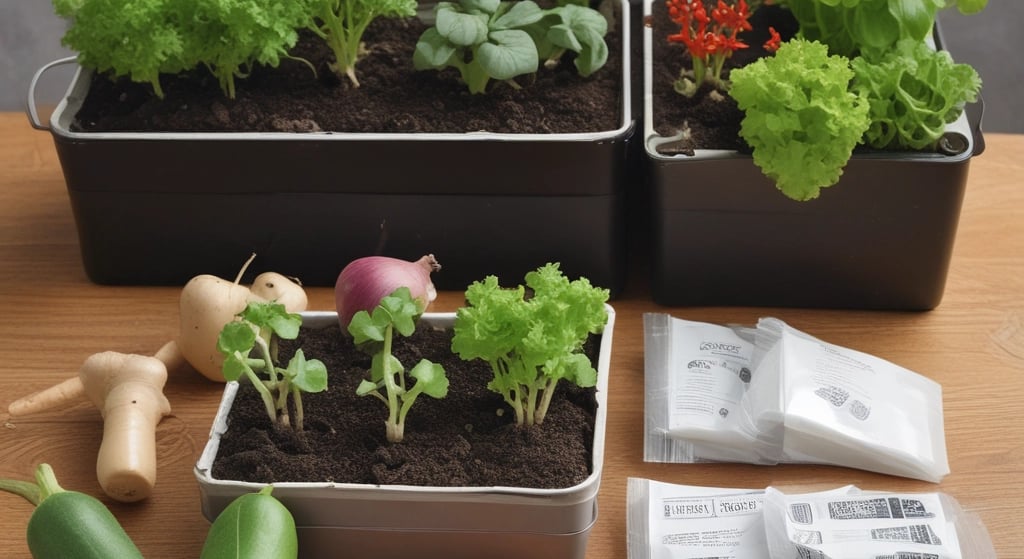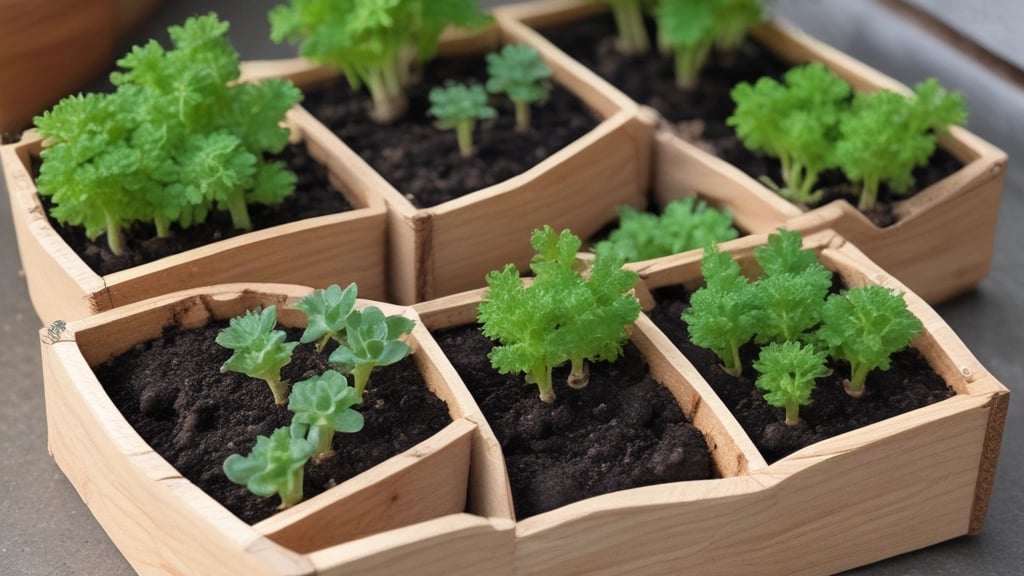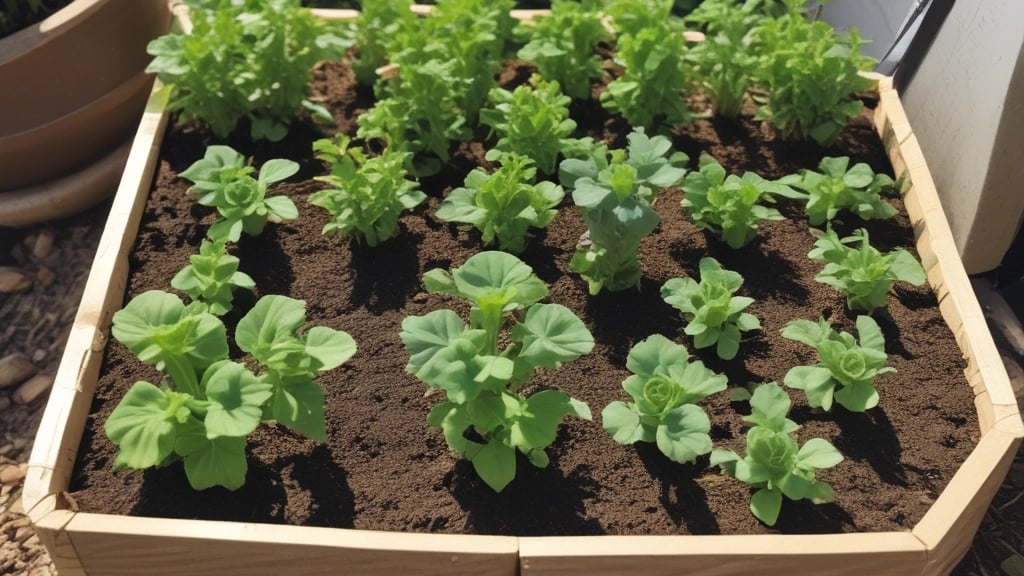Top 5 Organic Vegetable Garden Starter Kits for Beginners
Begin your organic gardening journey! Explore the best vegetable garden starter kits for beginners and grow fresh produce fast.
VEGETABLES & HERBS
9/6/20259 min read


Introduction to Organic Gardening
Organic gardening is an agricultural practice that embraces natural methods to cultivate plants without the use of synthetic fertilizers or pesticides. This approach prioritizes sustainability and ecological balance, making it a favorable choice for those looking to contribute positively to the environment. By engaging in organic gardening, individuals can not only grow their own food but also support biodiversity, enhance soil health, and minimize their carbon footprint.
One noteworthy aspect of organic gardening is its numerous health benefits. Organic produce tends to be richer in nutrients because it is grown in healthy, organic soil and without harmful chemicals. Consuming organic vegetables can reduce pesticide exposure, providing a safer option for families, especially those with young children. Moreover, growing your own vegetables fosters a deeper understanding of where food comes from, promoting healthier eating habits and encouraging sustainable living practices.
For beginners, the idea of starting an organic vegetable garden can seem daunting. However, with the right tools and guidance, anyone can create a thriving garden space. Starter kits specifically designed for novice gardeners offer a convenient and efficient way to embark on this journey. These kits typically include essential supplies such as seeds, soil, and instructional materials, removing the overwhelm often associated with beginning a gardening venture.
The appeal of an organic vegetable garden lies in its ability to provide fresh, healthful produce directly from one’s home. This not only contributes to personal wellness but also inspires a sense of accomplishment as one nurtures and watches their plants grow. As we explore the top organic vegetable garden starter kits available in the USA, it is important to recognize their role in simplifying the gardening process for those just beginning their organic gardening adventure.
What to Look for in a Gardening Starter Kit
When embarking on the journey of gardening, particularly for beginners, selecting the right organic vegetable garden starter kit is crucial to ensuring a seamless experience. Key features play a pivotal role in the decision-making process. First and foremost, beginners should consider the variety of seeds included in the kit. A diverse range of seeds allows novice gardeners to experiment with different vegetables, catering to personal taste and dietary preferences. Kits that offer an array of well-suited seeds for the regional climate also enhance the likelihood of successful growth.
The quality of soil and compost is another critical factor to review. The ideal starter kit should include nutrient-rich, organic soil or compost that fosters healthy plant growth. Experienced gardeners understand that good soil is the foundation of any successful garden, as it provides essential nutrients and aids in moisture retention. Ensure that the kit mentions the source and composition of the soil to make an informed choice.
Ease of use is essential, particularly for those new to gardening. Starter kits should include tools and instructions that simplify the gardening process. Basic tools like trowels, seedling trays, and watering devices should be part of the package to equip beginners adequately. Moreover, clear instructions help demystify planting processes and care techniques, minimizing potential frustrations.
Additionally, it is beneficial to explore the scalability of the kit. Beginners with limited space should look for compact or vertical gardening options, while those with more room may prefer traditional layouts. This consideration ensures that gardening becomes an enjoyable and rewarding pursuit without the overwhelming adjustments that often accompany the early stages.
By weighing these essential features, novice gardeners can select an organic vegetable garden starter kit that aligns with their specific gardening goals and capacity, fostering a rewarding experience that encourages growth and confidence in their new hobby.
Top 5 Organic Vegetable Garden Starter Kits
Establishing an organic vegetable garden is a fulfilling endeavor, especially for beginners. The right starter kit can aid this process significantly. Below, we review five of the top organic vegetable garden starter kits available in the USA, highlighting their key features, benefits, and any noted drawbacks.
1. Gardeners Supply Company Organic Vegetable Garden Kit
This kit includes 25 seed packets of assorted vegetables and herbs, offering a diverse planting option. Made from biodegradable materials, the containers promote sustainable gardening practices. User reviews praise the high germination rates and comprehensive instructions provided, making it an excellent option for beginners.
2. Back to the Roots Organic Vegetable Garden Starter Kit
Featuring a unique indoor planting system, this kit enables beginners to grow vegetables on kitchen countertops. Included are organic seeds for basil, lettuce, and a variety of other herbs. Customers appreciate the easy-to-follow instructions and the compact size, allowing for limited space gardening.
3. Seed Savers Exchange Organic Vegetable Garden Starter Kit
This kit focuses on heirloom vegetables and provides ten different seed packets. It emphasizes sustainable gardening and includes a detailed guide on organic gardening practices. Users find great value in the quality of seeds and their ability to be saved for future planting seasons.
4. Urban Leaf Organic Microgreens Grow Kit
Perfect for those with minimal space, this kit allows the cultivation of organic microgreens. It includes a selection of diverse seeds and all necessary materials for successful growth. Customers love the fast harvest cycle and the nutritional benefits of microgreens.
5. Planters' Choice Organic Vegetable Garden Starter Kit
This all-in-one kit includes everything needed for a productive garden, from organic seeds to biodegradable pots. Reviewers highlight the variety of seeds and the clear instructions that accompany the kit. The affordability makes it an attractive option for novice gardeners.
For easy comparison, a summary table of these kits, covering key criteria such as seed variety, materials, and pricing, is recommended to assist potential buyers in making informed decisions about the best organic vegetable garden starter kits for their needs.
Benefits of Using Starter Kits for Beginners
For novice gardeners, starting an organic vegetable garden can be both exciting and daunting. One practical solution to ease the transition into gardening is opting for starter kits, which provide numerous advantages tailored specifically for beginners. These kits are meticulously curated, ensuring that they include a selection of appropriate seeds that thrive in various climates and conditions across the USA. This thoughtful assembly not only saves valuable time in planning but also simplifies the decision-making process for those unfamiliar with choosing the right vegetables to grow.
Additionally, starter kits typically encompass all the essential tools and materials needed for gardening. From pots, soil, and fertilizers to tools like trowels and watering cans, these kits alleviate the stress of sourcing individual items. By providing everything in one package, beginners can focus solely on the joy of gardening, rather than the logistical hurdles that often accompany it.
Another significant benefit of starter kits is the inclusion of easy-to-follow instructions for planting and care. These comprehensive guides help beginners understand the optimal planting techniques, watering schedules, and maintenance practices required for their selected crops. Such structured guidance fosters confidence and encourages successful gardening experiences, making newcomers less likely to feel overwhelmed by trial and error.
Moreover, starter kits are often designed to promote a sense of accomplishment. With pre-selected seeds and clear instructions, beginners are more likely to see positive results in their gardening endeavors. This success can enhance their love for gardening, encouraging them to expand their skills and experiment with a broader variety of plants in the future. By cultivating not just vegetables but also a passion for gardening, these starter kits lay a solid foundation for novice gardeners to flourish.
Tips for Successful Gardening
Embarking on the journey of gardening, particularly with an organic vegetable garden starter kit, can be both exhilarating and overwhelming for beginners. To optimize your gardening experience and enhance your confidence, here are some practical tips essential for nurturing a thriving garden.
First and foremost, understanding optimal planting times is critical. Different vegetables thrive in varied climates and seasons; hence, familiarize yourself with the planting calendar for your region. This ensures that you are planting at the right time, maximizing growth and yield. Additionally, it’s beneficial to start your seeds indoors if your climate allows—this can give your plants a head start before transferring them outdoors.
Watering techniques are another vital component to consider. Consistent and adequate watering is essential for healthy growth. It’s recommended to water your plants early in the morning or late in the afternoon when temperatures are cooler. Deep watering, allowing moisture to penetrate the soil, is more effective than shallow watering, which can lead to weak root systems. Furthermore, mulching helps retain soil moisture and regulate temperature, making it a beneficial practice for your garden.
Pest management should not be overlooked in your gardening pursuits. Regular inspections of your plants will allow you to catch pest problems early on. Implementing natural pest control methods, such as introducing beneficial insects or using homemade sprays, will help protect your garden without relying on harmful chemicals. Additionally, fostering a diverse garden ecosystem can minimize pest infestations.
Lastly, indulging in companion planting can significantly enhance your garden's health. Certain plants thrive alongside one another, as they can deter pests, improve growth, or enhance flavors. By practicing this method, you contribute to a balanced ecosystem in your garden.
In conclusion, successful gardening is a learning process that requires patience and observation. By following these tips, beginners can cultivate an organic vegetable garden that flourishes and offers rewarding results.
Common Mistakes to Avoid
Starting an organic vegetable garden can be a rewarding endeavor, but beginners often encounter challenges that hinder their success. One of the most common mistakes is overwatering, which can lead to root rot and other fungal problems. New gardeners might mistakenly believe that more water contributes to healthier plants, but in reality, most vegetables require consistent yet measured watering. A better approach is to check the soil moisture regularly; using your finger to test the top inch of soil can determine whether a plant truly needs water.
Another frequent oversight is neglecting soil health. Many novices may assume that any type of dirt will suffice for planting. However, healthy, productive gardens thrive in nutrient-rich soil with the right pH balance. Beginners should prioritize soil testing, which evaluates nutrient levels and acidity. Enriching soil with organic compost or well-rotted manure can greatly improve plant health and yield. Additionally, rotating crops each season can prevent nutrient depletion and reduce pest issues.
Insufficient sunlight is yet another common pitfall. Many new gardeners may not consider the light requirements of their chosen vegetables before planting. Most vegetables, such as tomatoes and peppers, require at least six to eight hours of direct sunlight daily. Selecting a spot that is unobstructed by buildings or trees is crucial for optimal growth. Beginners should observe their selected gardening area throughout the day to ensure it receives adequate light, adjusting their planting range as necessary.
Finally, failing to plan for pests and diseases can lead to significant setbacks. While organic gardening emphasizes natural methods for controlling pests, vigilance is still essential. Regular inspection of plants can help catch problems early. Integrated pest management techniques, combining preventative strategies with natural solutions, can aid in maintaining strong and healthy vegetables. By avoiding these common mistakes, novice gardeners can foster a more successful and sustainable organic vegetable garden.
Conclusion and Next Steps
Starting an organic vegetable garden is an enriching experience that offers numerous benefits. Not only does it provide access to fresh, nutritious produce, but it also contributes to environmental sustainability by reducing the carbon footprint associated with store-bought goods. Engaging in gardening can also foster a deeper connection with nature and promote overall well-being, making it a valuable practice for individuals and families alike.
Utilizing a starter kit is an ideal pathway for beginners. These kits typically include essential tools and supplies, guiding novice gardeners through the intricacies of planting, nurturing, and harvesting their own vegetables. By providing a comprehensive introduction to organic gardening, these kits alleviate some of the initial challenges that new gardeners may face, thus cultivating confidence and enhancing the overall gardening experience.
For those who are ready to take the plunge into gardening, there are several resources available to support your journey. Online communities and forums dedicated to gardening can be a treasure trove of advice and inspiration. Websites such as Reddit’s gardening subforum or Facebook groups focused on gardening can provide camaraderie and a platform to share experiences. Additionally, reading books on organic gardening techniques can deepen your understanding and extend your knowledge. Titles such as "The Organic Gardener's Handbook of Tips and Techniques" offer practical advice for gardeners at all levels.
Furthermore, consider joining a local gardening club to connect with fellow enthusiasts. These clubs often host workshops, plant swaps, and community gardening events that can enhance your skills and enrich your understanding of organic practices. As you embark on your gardening journey, do not hesitate to document your progress and share your successes with others. Your personal experience can inspire and encourage others to start their own organic vegetable garden, perpetuating a collective appreciation for growing food sustainably.
Want to Know More?
Please Read :
How to Grow Herbs Indoors Without Sunlight: The Complete Beginner’s Guide








Subscribe
Join us for tips and product reviews.
Contact
Affiliate disclaimer
info@honestgardener.com
© 2025. All rights reserved.
As an affiliate, we may earn a commission from qualifying purchases. We get commissions for purchases made through links on this website from Amazon and other third parties.
